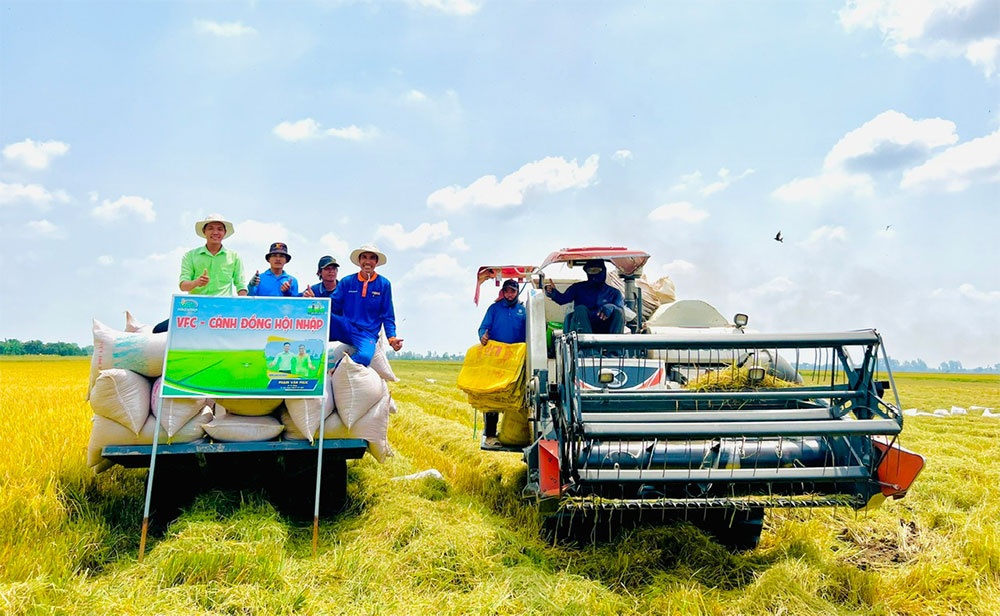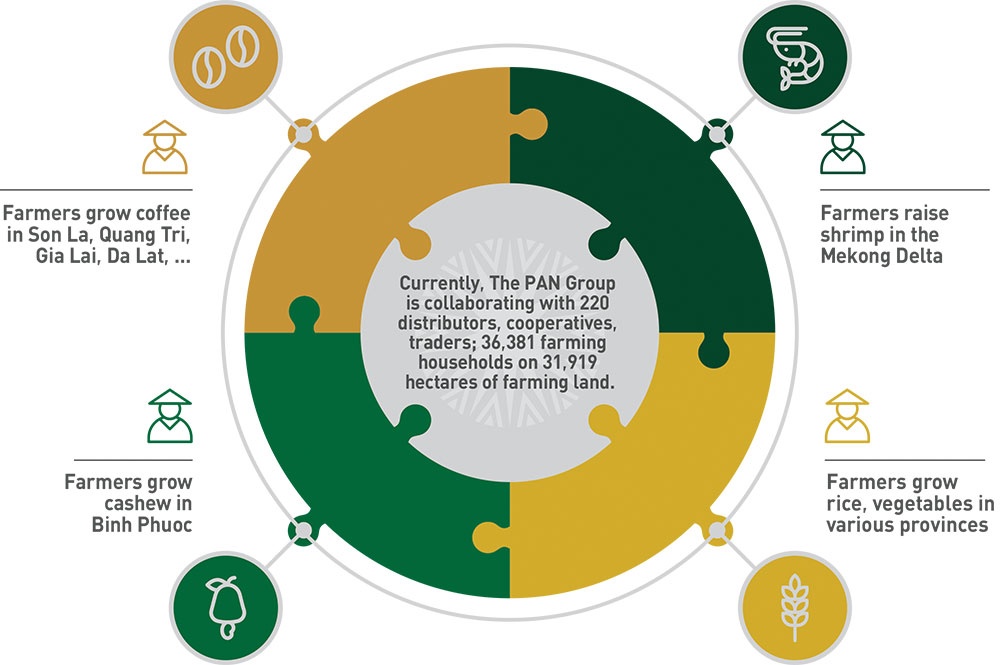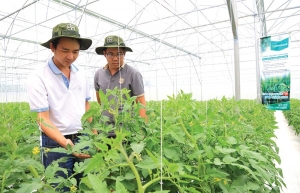Sustainable agriculture and the indispensable human factor
Agriculture is the pillar to ensure food security, while creating a stable life foundation for nearly 60 per cent of the Vietnamese population in rural areas. Playing an important role in implementing sustainable development goals, sustainable agriculture will ensure development opportunities for future generations, the ability to adapt and withstand changes, and harmonise the economic elements with the environment and society.
 |
| Sustainable agriculture and the indispensable human factor |
In this, people play a crucial role in achieving such goals. When each subject of the economy becomes healthy and people’s lives are upgraded, other aspects such as society and the environment will also be improved.
In a recent discussion about these issues, Minister of Agriculture and Rural Development Le Minh Hoan said, “When I talk to farmers, there are often questions that make me very concerned. For example, if farmers are excellent, diligent, and intelligent, why aren’t they as wealthy as South Korean or Thai farmers?”
Such questions have basis. The agricultural sector has been considered a main pillar of the economy. From an undeveloped agricultural country that had to import food, Vietnam has become one of the world’s top agro-forestry-fishery exporters.
Despite having this breakthrough, the sector still faces many difficulties. Farmers are in the group with the lowest income in society, less than one-third of the average income of people in the industrial and service sectors and 20 times less compared to South Korean farming incomes.
Currently, over 90 per cent of poor households are located in rural areas, especially in ethnic minority and mountainous areas. Compared to other sectors of society, farmers are still vulnerable and subject to many risks in production and life.
Promoting the nucleus role
Localities’ reports strongly suggest that only about 20 per cent of agricultural areas are in commodity chains, and not all chains are sustainable. The problem is to improve the sustainability of the linkage chain between producers and businesses, thereby resolving the curse of fragmentation, small-scale, and spontaneous production, as Minister Hoan has stated.
The agricultural picture is generally bright, as a number of major enterprises participate deeply and decisively in the value chain with practical and effective solutions. With the goal of enhancing the value of rice grains, improving income for rice growers, and contributing to improving the competitiveness of Vietnamese rice internationally, The PAN Group has implemented many programmes to cooperate and support farmers in terms of knowledge, skills, and materials.
Commenting on the bottleneck in the current rice value chain, which is causing incomes to remain low, a representative of The PAN Group said that despite playing a central role, farmers are facing many problems ahead.
“For example, rice cultivation techniques can be poor, and often heavily depend on fertilisers and pesticides without mastering the techniques how to use these products correctly,” the representative said.
“In addition, the scale of rice cultivation is still fragmented, in collaboration with the low mechanisation rate, leading to high costs and eroding farmers’ profits. Furthermore, the consumption link area is still low, thus, broken deals between businesses and farmers are still common,” the spokesperson added.
Integration Field is a large-scale and long-term initiative that has been implemented by The PAN through its member, Vietnam Fumigation JSC, since 2012. In the past two years alone, it has helped to significantly increase productivity and profits compared to older farming methods.
Specifically, profits have increased by 25 per cent, equivalent to about $575 per hectare, contributing to helping total costs decrease by 10 per cent and productivity increase by 8 per cent, equivalent to about 1.5 tonnes per hectare.
In addition to increasing the income of rice growers, economic development goals are also accompanied by environmental goals and mitigating greenhouse gas emissions. Accordingly, an alternate wetting and drying method is applied to save water. Furthermore, the schemes help in reducing irrigation water sources; reducing the number of seeds sown; applying appropriate fertilisation procedures according to ecological region; and using plant protection production to reduce use of chemical fertilisers and spraying time, thereby reducing emissions.
Through its members in agriculture and fisheries, The PAN Group is mastering the supply chain by cooperating with 220 agents, cooperatives, traders, and more than 36,000 farmer households, across nearly 32,000ha of farming, creating sustainable livelihoods for nearly 10,000 workers, of which 30 per cent of people are ethnic minorities.
Replicating the success of the Integration Field initiative, The PAN Group is cooperating with Dong Thap People’s Committee to implement a scheme on improving rice grower incomes. Placing farmers as the central subject, the project aims to promote efficiency at each stage in the rice value chain, save costs, and improve productivity to increase incomes.
With the participation of its members in the agricultural sector, including Vinaseed, Vietnam Fumigation JSC, and Vinarice, the project will support local farmers in accessing standard, sustainable agricultural practices, thereby driving a path to success.
Along with the government’s project of sustainable development of one million hectares of high-quality, low-emission rice cultivation in association with green growth in the Mekong Delta by 2030, The PAN’s project in Dong Thap will support farmers to improve their rice cultivation skills and use copyrighted varieties.
The project also strives to reduce the amount of chemical fertilisers and pesticides of chemical origin in rice production, provide technical support, and strengthen links in consuming output products for farmers in Dong Thap.
Thereby, the project will contribute to increase the profit for local rice growers by 40 per cent by 2030.
 |
Nurturing future farmers
According to statistics from the Ministry of Education and Training, in 2022, the country had more than 521,000 students enrolled in 25 training fields. However, only 7,100 students enrolled in the agro-forestry-fisheries sector or veterinary medicine, accounting for just over 1 per cent. Meanwhile, a World Bank report published in 2019 showed that Vietnam will need about 40,000 engineers in these industries by 2025.
The farmer force is seriously declining, while agriculture has to face up to challenges related to technology, productivity, sustainability, and high competition, requiring a workforce that includes traditional as well as high-tech farmers.
In a workshop chaired by the Ministry of Agriculture and Rural Development in July 2023, The PAN Group contributed a discussion with the observation that it needs to come closer to students of agricultural schools, helping them understand more about the prospects of farming, and contributing to solving the current human resource problem.
Nguyen Thi Tra My, CEO of The PAN Group, said, “We need a long-term strategy with specific plans to upgrade Vietnamese agriculture, in which improving human resources is an important requirement to help the agricultural sector keep up with the digital transformation.”
Not stopping at a cooperation agreement or a scholarship for students, The PAN has proposed a long-term cooperation model with agricultural schools with the goal of focusing on developing human resources.
The company has signed agreements to award a scholarship fund worth $127,000 to three universities – Vietnam Academy of Agriculture, Hue University of Agriculture and Forestry, and Thai Nguyen University of Agriculture and Forestry.
Along with the aim to attract very talented students, the scheme also aims to train and inspire future generations in the industry through startup competitions, student dialogues, career orientations, and internship opportunities at member companies of the group.
“In addition to the commitment to award scholarships to students, the main purpose of our programme is to propose solutions that contribute to solving the industry’s difficult problems, inspiring students to be confident, brave, and ready to embark on an agricultural journey that is extremely meaningful,” CEO Tra My said.
 | Agriculture can be driver to attract overseas funds Vietnam is expanding international cooperation as an effective solution to reach its target of attracting $25 billion in foreign investment in the agricultural sector by 2030. |
 | Agricultural businesses in dire need of workers Difficulty in recruiting workers, including both unskilled and trained workers, has led to labour shortages and major headaches for many agricultural enterprises. |
 | Technology investment key to sustainable agriculture At the Sustainable Development 2023 conference in Hanoi, experts underscored the critical role of technology in advancing sustainable agriculture, noting the need for precise farming methods and the long-term cost benefits of initial investments in digital transformation. |
What the stars mean:
★ Poor ★ ★ Promising ★★★ Good ★★★★ Very good ★★★★★ Exceptional
Related Contents
Latest News
More News
- Trung Nam-Sideros River consortium wins bid for LNG venture (January 30, 2026 | 11:16)
- Vietnam moves towards market-based fuel management with E10 rollout (January 30, 2026 | 11:10)
- Envision Energy, REE Group partner on 128MW wind projects (January 30, 2026 | 10:58)
- Vingroup consults on carbon credits for electric vehicle charging network (January 28, 2026 | 11:04)
- Bac Ai Pumped Storage Hydropower Plant to enter peak construction phase (January 27, 2026 | 08:00)
- ASEAN could scale up sustainable aviation fuel by 2050 (January 24, 2026 | 10:19)
- 64,000 hectares of sea allocated for offshore wind surveys (January 22, 2026 | 20:23)
- EVN secures financing for Quang Trach II LNG power plant (January 17, 2026 | 15:55)
- PC1 teams up with DENZAI on regional wind projects (January 16, 2026 | 21:18)
- Innovation and ESG practices drive green transition in the digital era (January 16, 2026 | 16:51)

 Tag:
Tag:



















 Mobile Version
Mobile Version